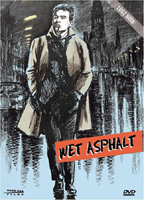 BUY IT AT AMAZON: CLICK HERE!
BUY IT AT AMAZON: CLICK HERE!
STUDIO: Dark Sky Films
RATED: Unrated
MSRP: $14.98
RUNNING TIME: 89 Minutes
SPECIAL FEATURES: None
"A
lie is nothing more than a journalist’s trademark," says reporter-extraordinaire
Cesar Boyd during the climax of Wet Asphalt. Though the film was
made in 1958, the statement remains poignant in today’s media-centric culture. In
recent memory, we have had the scandals about Jayson Blair, and Stephen Glass,
the latter of which was the subject for Billy Ray’s damn-good Shattered
Glass. If anything, Boyd’s rather cynical statement has an even greater
potential for truth nowadays.
Inasmuch
as it features a story that is possibly more relevant today than when it was
first filmed, Wet Asphalt is a well-made and engaging film. Its concept is
arresting, and its execution is flawed but not cripplingly so.
The Flick
They say
that the truth is stranger than fiction, but nothing sells more papers than a
damn good lie. At the film’s opening, young German reporter Greg Bachmann (Horst
Buchholz) has just been released from jail following a series of stories he
wrote in conjunction with
second world war. Soon, he finds himself right back in the daily rag trenches,
in service to veteran reporter Cesar Boyd (Martin Held). Boyd is a real
gentleman reporter; he works from his mansion, writing stories as they come to
him for publication globally. He employs Bachmann to ghost write a number of
articles, to run research, to cover local events, basically the grunt work.
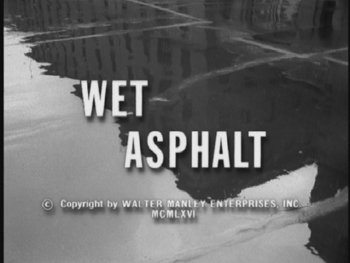
Wow. They weren’t kidding.
One day,
realizing he is late for a deadline, Boyd concocts a story about a blind young
Nazi soldier who had been trapped in a Polish bunker for the six years since
the end of the war. The soldier, Boyd writes, has been rescued, but is being
held by the Poles. The story is picked up by newspapers in
about this fictional soldier, and Bachmann is buzzing right along with him.
Unfortunately, Bachmann’s enthusiasm for a good story takes him a bit too far,
as he gradually uncovers the truth about his employer’s fabrications.
This disc
is labeled by distributor Dark Sky Films as a "lost noir". As a noir,
this scenario lacks a few of the key touchstones. There is no violence, for
example, outside of a climactic and faceless mob demonstration. There’s not
much in the way of a femme fatale,
except for Boyd’s young niece, who doesn’t get to do a whole lot of fatale-ing.
Some of
the broader elements of noir are present, though. Bachmann’s paranoia undergoes
a bit of a subversion from the norm, as the source of his unease is right in
front of him the whole time, but it is palpable. Plots within plots are hatched
and discarded. The oppressive forces of other peoples’ wills buffet Bachmann
around. And the verbal sparring, so important in noir, is in full effect, with
dialogue that is thin on character but heavy on content.
That
description actually works for the overall feeling of the movie. The characters
are somewhat thin. Bachmann is a bit clueless for most of the running time; as
a result, the changes in his character aren’t given a lot of time to bloom, and
instead come at spine-cracking speed. Rather than being shocking, or
devastating, it feels more abrupt, almost rude. Boyd is practically a
mustache-twirler, but is saved from over-indulgence by the deliberate pacing of
Held’s performance. As mentioned before, Boyd’s niece is the ostensible female
lead, but barely even serves as a foil for Bachmann’s character.
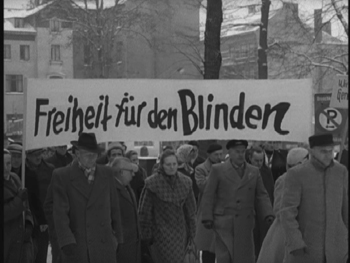
According to Babelfish, the banner reads "Temperature for Ten Windowblinds".
Where the
characters appeal only as sketches to the audience, the plot handily makes up
the balance for their attention. There is an excellent momentum to the script,
carrying Bachmann through his series of revelations that culminates in his
facing off against Boyd. The climax is perfect, more of an anti-climax in which
violence is abandoned in favor of a clash of character that leaves both men in
a sort of middling state. Neither can claim victory nor defeat.
It seems
a natural progression to take noir from the seedy streets of private detective
work into the well-lit corridors of investigative journalism. Wet
Asphalt supports the case decently, sussing out shades of gray from
all the black ink.
6.5 out of 10
The Look
The full
frame black-and-white presentation is restored well enough, but there are a few niggling
details that degrade its score. In some shots, the clarity is poor, setting a
low fidelity around moving objects. Also, there is some artifacting present
across occasional cuts.
On the
positive side, the cinematography has an expressive German austerity that fits
the tone of the film perfectly. The balance of shades in individual shots is
nearly always perfect (the frequent use of formal wear, for example, makes for
some subtle but impressive visual metaphors).
6 out of 10

As a part of their "humorous misdirection" campaign, the Polish army
decided to make the town of Babie Doly their base of operations.
Thenceforth, none of the officers slept secure in their sexuality.
The Noise
The only
track available is in plain-Jane mono, English dubbed. It would have been nice
to have the original German dialogue with subtitles, for preference, but the
dubbing is generally high-quality. There is a bit of a problem in that the
voice actors for Bachmann and Boyd sound almost identical and, when the shots
are composed so as neither man’s lips are fully visible, it makes conversations
a bit hard to keep up with.
The
incidental music isn’t well-matched to the sequences it supports. Its problem
is that it overcompensates, shooting well beyond the subtle emotion of the
script to needlessly emphasize cliché emotions.
4 out of 10
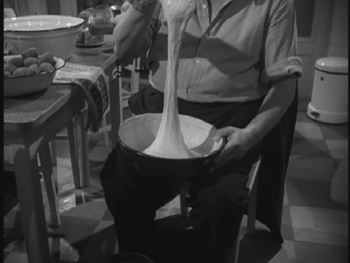
Don’t listen to Chekov. Moon Goop was totally a German inwention.
The Goodies
If
goodies were money, this disc would own not one red cent.
0 out of 10
The Artwork
A very
nice style was drawn up for this cover. The heavy, sketched lines and pale
colorizations are distinct and attractive. The clear case is nice, too, as is
the efficient use of printing of the chapters on the inside of the front cover
so they show through the case.
I do have
a slight problem with the marketing blurb on the back in that instead of a
blurb it’s actually a full pitch for the movie, beginning to end. It reminds me
of a copy of Wieland by Charles Brockden Brown in which the central mystery
of the narrative is spoiled clear-as-you-please on the back cover, thus
removing all of the possible reasons
for reading the book.
7 out of 10
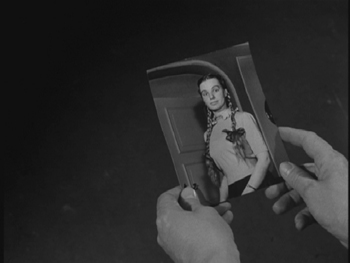
"I met her one morning / At Johns-Hopkins University /
The first thing she said was, / ‘Baby, I’m a he!’"
Overall: 6 out of 10